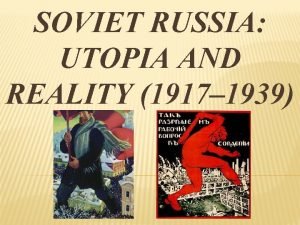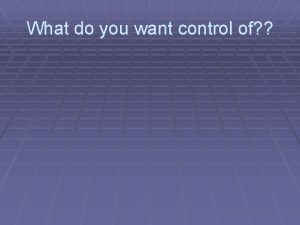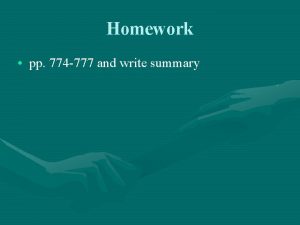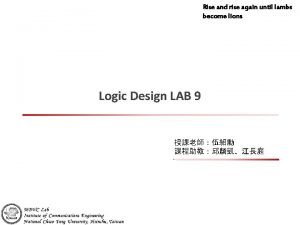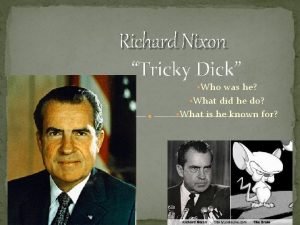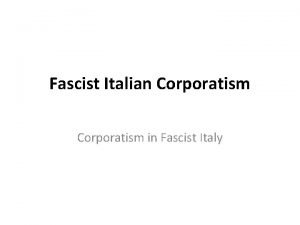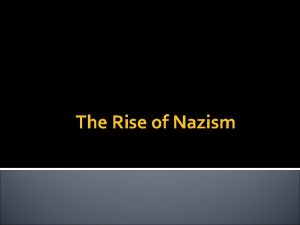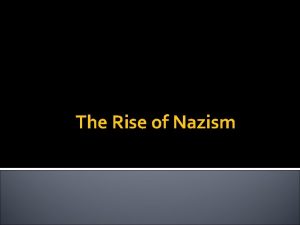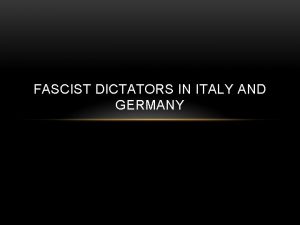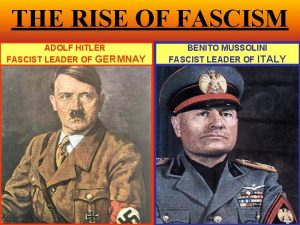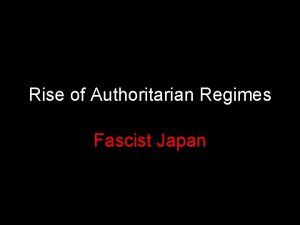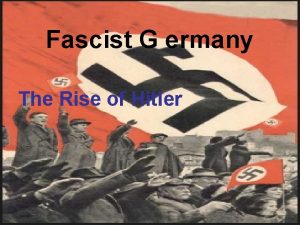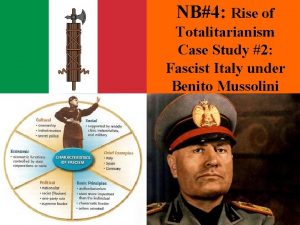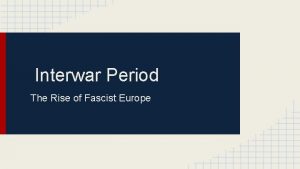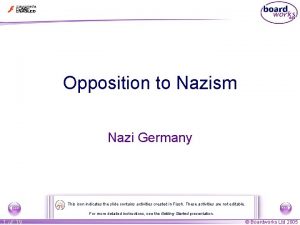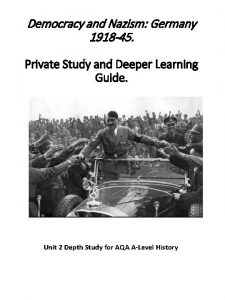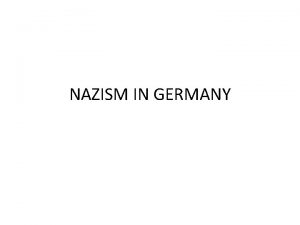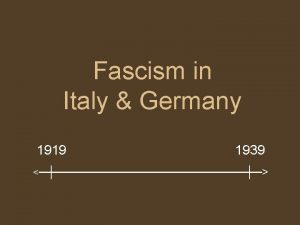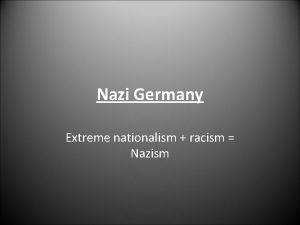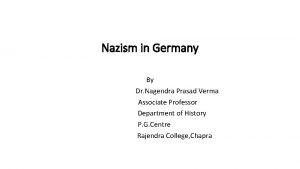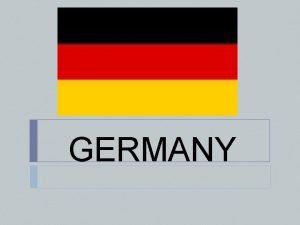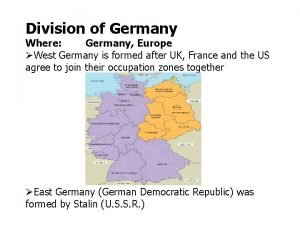The Coming of Fascist Germany Rise of Nazism












































- Slides: 44

The Coming of Fascist Germany


Rise of Nazism: Hitler • How important is the individual in History? – Borrowed ideas Mussolini, Darwin, Rousseau, Hegel, Nietzche – His interpretation of them? • Conventional or Unconventional early life? – Hitler himself was very vague on his early life • Why? • Significance? – Page 55 of Hite and Hinton






Unusual Experiences His Beliefs His Skills/Strengths His Weaknesses


Post Munich 1923 - 1929 • Trial – Turned into blistering attack on Versailles, Weimar and Kahr/Lossow • Nationwide coverage • Sympathetic Right wing judges • 5 Years sentence (eligible for parole after 9 months) – Minimum for Treason • 9 Months in Landsberg Prison – Open prison • Could receive visitors, presents, cards, etc… – Dictated Mein Kampf to Hess – Temporarily resigned from Party • Allowed Strasser, Ludendorff and others fight over what to do next – Ride to the rescue on Release?

The Roller Coaster Ride Date of Election Jan Jun 1 1 9 9 1 2 9 0 Ma Ma y Dec y Sep Jul Nov Mar 1 1 1 1 9 9 9 9 2 2 2 3 3 4 4 8 0 2 2 3 SPD Social Democrats 165 102 100 131 153 143 133 121 120 Communists KPD/USPD 22 88 62 45 54 77 89 101 81 Centre Party (Catholics) 91 64 65 69 62 68 75 70 74 DDP (Democrats) 75 39 28 32 25 20 4 2 5 Right-wing parties (BVP/ DVP/DNVP) 63 157 156 174 134 90 66 83 72 NSDAP (Nazis) 32 14 12 107 230 196 288

Biding his time before Rebuilding • 1925 Presidential election – Ludendorff got less than 1% standing on a Nazi ticket • Hitler Refounded the party in 1925 – Lays foundations of Fuhrer. Prinzip • Gave Hitler supreme power over policy and strategy – 25 points still kept • More formal rituals introduced – Uniforms » Brown shirts for SA – Flags » Red, Black and White flags with Swastikas » Wind up Communists » Same colours as Wilhelmine flag – Saluting » Heil Hitler (Hess the instigator) – Propaganda » Image building

Organisation of Nazis • The more socialist minded Strasser and Goebbels had built up a reasonably strong party structure in Protestant and Trade Union dominated North Germany – The Nazis would benefit but from this strategic shift – However, Hitler personally now had a viable rivals for the movement • Strasser and Goebbels • Bamberg conference 1926 – Divide and rule principle • Outmanoeuvred more socialist minded Strasser • Promoted the very able Goebbels

Creating a Movement • He set up a network of local parties. – Gauleiter appointed directly by Hitler • He worked with other right-wing parties when necessary. – Eg Hugenberg’s DNVP over anti-Young Plan campaign of 1929 – Hugenberg was the proprietor of a huge media empire • He set up the Hitler Youth, to attract young people to the party. • He created the SS – As a rival to the less than 100% dependable SA • He put Josef Goebbels in charge of propaganda – Appeal to feelings rather than argument. – using traditional and new media • posters, leaflets, radio and film, and organised rallies. • He cultivated the support of wealthy businessmen – promising them that he would destroy Communism and the Trade Unions. – This gave him the finance to run his campaigns. • Built up the idea of Volksgemeinschaft

Hitler’s financiers Hjalmar Schacht, Head of the Reichsbank, organised fund-raising parties for Hitler. Fritz von Thyssen, the German steel businessman Alfred Krupp, the owner of Krupp steel firm Emil Kirdorf, the coal businessman IG Farben, the German chemicals firm, gave half the funds for the 1933 elections The German car firm Opel (now a subsidiary of General Motors) Schroeder Bank – on Jan. 3, 1933, Reinhard Schroeder met Hitler and asked him to form a government. And even some foreign firms including: Henry Ford of Ford Motors. Hitler borrowed passages from Ford's book The International Jew to use in Mein Kampf and had a picture of Ford on the wall of his office. Union Banking Corporation, New York (George Bush’s great-grandfather was president of the Corporation) WA Harriman and Co. , the American shipping and railway company (George Bush’s grandfather was vice-president) Irenee du Pont, head of the American firm General Motors; he advocated the creation of a super-race by spinal injections to enhance children of ‘pure’ blood.

Volksgemeinschaft • The basis of National Socialism – National Community • Restore hope to all Germans • Economic problems would be solved • Traditional German values would be promoted – The noble peasant and honest small businessmen would be protected – Militarism and respect restored to its preeminent position in German society • Germans would help themselves • Split personality of National Socialism – Equal opportunities for all Germans • But only pure blood Germans • Volksgemeinschaft not available to other lesser peoples – Jews particularly excluded – Notably, monarchists excluded privately (but not publicly)

But still little success pre 1930 Date of Election Jan Jun 1 1 9 9 1 2 9 0 Ma Ma y Dec y Sep Jul Nov Mar 1 1 1 1 9 9 9 9 2 2 2 3 3 4 4 8 0 2 2 3 SPD Social Democrats 165 102 100 131 153 143 133 121 120 Communists KPD/USPD 22 88 62 45 54 77 89 101 81 Centre Party (Catholics) 91 64 65 69 62 68 75 70 74 DDP (Democrats) 75 39 28 32 25 20 4 2 5 Right-wing parties (BVP/ DVP/DNVP) 63 157 156 174 134 90 66 83 72 NSDAP (Nazis) 32 14 12 107 230 196 288


The Young Plan 1929 • 1929 Renegotiation of Reparations repayments – Actually significantly eased repayments • Referendum called – Nazis join with Hugenburg’s Nationalist DNVP in denouncing the Young Plan • If you supported the Young Plan – you were in favour of the Treaty of Versailles – Hugenburg owned a vast media empire • Gave Nazis first significant nationwide exposure • Also gave Nazis some nationalist credibility by being identified with Hugenburg and anti-Treaty campaign – Only received 14% in referendum • But – Nazis identified as being a serious opponent to the Government

The Wall Street Crash • America sneezes – 1929 Sudden collapse in Wall Street Shares • Widespread panic selling • Urgent need for US investors to repatriate capital invested abroad • Germany Catches a cold – US short term loans had been invested in long term projects in Germany – Severe difficulties for German companies in covering capital outflows – Deflationary effect on economy • Germans still worried about Hyperinflation – Deficit financing frowned upon – Classical economic model praised balanced budgets • Massive layoffs and unemployment ensue

Despair • Paramilitary units blossom – Brownshirts offer food, clothing and accommodation for recruits • Likewise – Stahlhelm – Communist Red Shirts – SPD’s Reichsbanner • Bored, hungry, desperate recruits joined these paramilitary groups and fought proxy battles in the streets • Violence bred violence • Authorities losing control of large sectors of urban centres

Mass Unemployment • Registered unemployed increased from: – 1. 6 million in October 1929 – 6. 12 million by February 1932 – In fact, it was probably nearer 8 million in total (33% of working population) – Including dependants, 23 million people were directly effected by unemployment • Germany’s Insurance system stretched to breaking point and beyond – Only designed with 800, 000 in mind – Increased governmental expenditures when government trying to balance books.

Fall of Müller Government, 1930 • Dispute over Unemployment benefit – Right wing DVP wanted to cut back unemployment payments • Balance books as per classical economic orthodoxy – Left Wing (Trade Union sympathetic) SPD wanted to protect unemployment benefits • Fundamental disagreement plus increasing lawlessness in Germany lead to resignation of Muller government – March 1930

Brüning Government • President Hindenburg appointed Centrist/liberal government under Brüning – Imposed austerity budget • i. e. cuts to balance budget • Defeated by parliament but passed by Article 48 (presidential decree) • Parliament still protested so Hindenburg dissolved parliament and called for new elections

The Nazi Party’s First Electoral Breakthrough • Nazis win 107 seats – Up from 12 in previous election • Although Communists also do well – Up to 77 seats • Nazis not tainted by association with government policies – Purely oppositional – Seem to offer an alternative – Soup kitchens, brown shirts, etc… seem to offer some practical examples of their good intentions

Brüning Government hobbles along • Pro-Republic parties do poorly in elections • Brüning needs to have tacit support of SPD to avoid being voted down by anti-Republic parties – i. e. Nazis and Communists. • What’s in it for SPD? – SPD hopes that it can restrain worst excesses of austerity measures – SPD hoping to avoid Brüning having to turn to Nazis for support – SPD needed support of Brüning’s Catholic party in order to continue running Prussia State legislature • Costs to SPD – SPD unable to offer opposition – SPD will be associated with unpopular Austerity measures

Brüning Government hobbles along • Nazis turned up in their brownshirts • Nazis and Communists frequently shouted down speakers – Fights often broke out in or around the parliament building • Brüning had no clear majority – Increasingly relied on using Hindenburg’s Article 48 to get laws passed – Parliamentary sessions were cut back to avoid unnecessary confrontations • 1930 it met for 94 days • 1931 it met for 42 days • 1932 it met for just 13 days! • The precedent for an authoritarian government had accidentally been set.

The Fatal Split in the Left! • SPD steadily lost support – Blamed for coming up with Weimar benefit system in the first place – Seen as being ineffective in standing up to austerity measures – Unable to form a government by itself – Losing support to more activist and oppositionist Communists and even to National Socialists • KPD (communists) – Under strict orders from Stalin not to help Social Fascists (SPD) – Disorder in Germany seen as a good opportunity to launch full communist revolution

The Harzburg Front • Meanwhile the right seemed to be unifying! • Named after Bad Harzburg antirepublican rally • Nationalists coalesce – Press Baron Hugenburg’s DNVP, Monarchists and Stahlhelm • Again, gives Nazis some respectability to be seen with respectable nationalists.

Brüning’s increasing unpopularity • Cuts – General Government expenditure restrained – Taxes increased – Civil Servant salaries cut – Wages frozen to 1927 levels – Unemployment benefit harder to get • Increases – Law and Order – Military – Agricultural subsidies • Particularly for Prussian estates! • All in line with classical economics! • Hoping to hold out until the general worldwide economy picked up. • Particularly concerned with Hyperinflation!

1932 Presidential Election • Brüning refused Hindenburg’s request to be reelected by a simple unopposed plebiscite – This strained Bruning’s relations with the President • At the height of economic difficulties • Hindenburg a stalwart of the nationalist right. – However, he lost support in his traditional heartland east – But, he gained new support from pro-republic parties in the West eg SPD and Catholics • Hindenburg received 53% of votes • Hitler received 37% of votes • Once again, even though they lost, it showed that the Nazis were the only effective opposition

Brüning’s Downfall • Scrapping Grain subsidies! – It was difficult to continue subsidising aristocratic East Prussian landowners in a time of national crisis. – This was anathema to Hindenburg who was determined to defend his aristocratic heritage • Plus Backroom intrigue – General Schleicher was negotiating with Hindenburg to see his old friend von Papen take over chancellor – Papen was a centrist too (so would not overly alienate Brüning’s party. ) – The ‘Cabinet of Barons’ would offer a more nationalist agenda for Germany and would protect aristocratic privilege. – Schleicher promised new elections and a lifting of the ban on the SA if Nazis did not oppose the creation of new nationalist government

The Cabinet of Barons • So called because of the quantity of barons, aristocrats and nationalists in the government. • Ideologically confused government but generally pro-monarchy and probusiness – Unemployment benefit cut yet further – Increased payments to Eastern farmers • Had to call for new elections in 1932

The Prussian Coup • The ban on the SA was lifted on June 16 th – Violence immediately erupted between Brown shirts, red shirts and Reichsbanner • 100 died mostly in Berlin • Disturbances used as an excuse by Papen to remove the SPD dominated government of Prussia (who were responsible for the police force) – SPD and Unions were stunned and did not know how to react • KPD ordered not to help SPD (Social Fascists) – SPD busily fighting National elections anyway • Not a healthy democratic precedent by Papen – Hitler and Goering interested by the muted response of the Left • Will use as a role model later!

1932 Breakthrough Date of Election Jan Jun 1 1 9 9 1 2 9 0 Ma Ma y Dec y Sep Jul Nov Mar 1 1 1 1 9 9 9 9 2 2 2 3 3 4 4 8 0 2 2 3 SPD Social Democrats 165 102 100 131 153 143 133 121 120 Communists KPD/USPD 22 88 62 45 54 77 89 101 81 Centre Party (Catholics) 91 64 65 69 62 68 75 70 74 DDP (Democrats) 75 39 28 32 25 20 4 2 5 Right-wing parties (BVP/ DVP/DNVP) 63 157 156 174 134 90 66 83 72 NSDAP (Nazis) 32 14 12 107 230 196 288

The Real Nazi Breakthrough • 1932 July elections – The Nazis received a stunning 37% of the vote? – Giving them 230 seats – by far the largest group • Who voted for the Nazis? – Look at pages 119/121 and • Why? – Compare what the Nazis were offering to what Weimar politicians were offering » Look at some of the election posters on pages 124/5 • Page 128 will also be helpful

Hitler wants a share of the spoils • With 230 seats, Hitler requests to be made Chancellor of a Presidential government – i. e. will be allowed to issue decrees rather than rely on Reichstag votes • Just like Bruning and Papen • Hindenburg flatly refuses • The Nazis vote against Papen in the Reichstag – September no-confidence vote, 512 – 42 • Required a new election under Weimar constitution • Election fatigue sets in

Nov 1932: What governments might have been formed? Date of Election Jan Jun 1 1 9 9 1 2 9 0 Ma Ma y Dec y Sep Jul Nov Mar 1 1 1 1 9 9 9 9 2 2 2 3 3 4 4 8 0 2 2 3 SPD Social Democrats 165 102 100 131 153 143 133 121 120 Communists KPD/USPD 22 88 62 45 54 77 89 101 81 Centre Party (Catholics) 91 64 65 69 62 68 75 70 74 DDP (Democrats) 75 39 28 32 25 20 4 2 5 Right-wing parties (BVP/ DVP/DNVP) 63 157 156 174 134 90 66 83 72 NSDAP (Nazis) 32 14 12 107 230 196 288

November 1932 – The Options? • Germany is still in the depths of Economic Depression! • Hitler – After sole control for Nazis – A presidential Cabinet • But power, finance and support slipping • Papen – Keen to stay as Chancellor – Wants Authoritarian government • Replace Reichstag • Use Army to impose order • Hindenburg – Tired but still sticking to the letter of the Weimar constitution if not to the Spirit • SDP – Embroiled in a battle for survival amongst the working classes • on the left against the KPD • On the right against the National socialists • Schleicher – Look for a grouping in favour of National reconciliation

Nazi stumble? • Nazis lost 2 million votes between July and November? – Why? • Hitler’s uncompromising attitude to power questioned internally – Seen as irresponsible – Allowing power to ebb away • Trade Unionist Strasser approached by Schleicher to form a government of national reconciliation – Diagonal Front • Trade Unions, Left Nazis, Conservatives and land reformers • Tame the Nazis by compromising them by the day to day running of government

The Schleicher Government • Schleicher advised Hindenburg that Papen’s authoritarian designs would provoke a Civil War. • Hindenburg followed Schleicher’s advice and reluctantly fired his friend Papen • Schleicher’s Diagonal Front new government was immediately dealt a blow by Strasser’s inability to join the government – Hitler expressly forbade Strasser from tainting National Socialism • National Socialism was to be the alternative to the Weimar government

Schleicher Hobbles along • With no natural body of support, Schleicher also needs the backing of Hindenburg to get laws passed with Article 48! • Schleicher’s measures to deal with unemployment and depression manage to alienate the left and the right! • Intrigue – Papen, Oskar Hindenburg and Hitler meet secretly to discuss a majority government! • Hitler determined to be Chancellor

Papen – Hitler Bombshell 16 th January 1933 • Papen convinces Hindenburg that he can control the Nazis • In return for Hitler’s 196 seats of support: – Hitler only wanted himself as Chancellor – Frick as Minister of Interior – Goering as Minister without portfolio • But with special responsibility for Prussia • Papen and the Nationalists would retain the 12 other cabinet seats including the key control of the economic, defence and foreign ministries • Germany would at last have a strong, stable government that reflected the will of the German people? !?
 Nazism vs communism
Nazism vs communism Nazism
Nazism Nazism
Nazism Fascist
Fascist Fascist corporatist economy ap world
Fascist corporatist economy ap world Fascist
Fascist Rise and rise again until lambs become lions origin
Rise and rise again until lambs become lions origin Rise and rise again until lambs become lions
Rise and rise again until lambs become lions Tricky dick
Tricky dick Rise and rise again until lambs become lions
Rise and rise again until lambs become lions Bổ thể
Bổ thể Vẽ hình chiếu đứng bằng cạnh của vật thể
Vẽ hình chiếu đứng bằng cạnh của vật thể độ dài liên kết
độ dài liên kết Các môn thể thao bắt đầu bằng tiếng đua
Các môn thể thao bắt đầu bằng tiếng đua Sự nuôi và dạy con của hổ
Sự nuôi và dạy con của hổ điện thế nghỉ
điện thế nghỉ Nguyên nhân của sự mỏi cơ sinh 8
Nguyên nhân của sự mỏi cơ sinh 8 Một số thể thơ truyền thống
Một số thể thơ truyền thống Trời xanh đây là của chúng ta thể thơ
Trời xanh đây là của chúng ta thể thơ Thiếu nhi thế giới liên hoan
Thiếu nhi thế giới liên hoan Số.nguyên tố
Số.nguyên tố Tỉ lệ cơ thể trẻ em
Tỉ lệ cơ thể trẻ em Phối cảnh
Phối cảnh Các châu lục và đại dương trên thế giới
Các châu lục và đại dương trên thế giới Thế nào là hệ số cao nhất
Thế nào là hệ số cao nhất Hệ hô hấp
Hệ hô hấp Tư thế ngồi viết
Tư thế ngồi viết Hình ảnh bộ gõ cơ thể búng tay
Hình ảnh bộ gõ cơ thể búng tay đặc điểm cơ thể của người tối cổ
đặc điểm cơ thể của người tối cổ Cái miệng bé xinh thế chỉ nói điều hay thôi
Cái miệng bé xinh thế chỉ nói điều hay thôi Mật thư tọa độ 5x5
Mật thư tọa độ 5x5 Tư thế worm breton
Tư thế worm breton ưu thế lai là gì
ưu thế lai là gì Tư thế ngồi viết
Tư thế ngồi viết Voi kéo gỗ như thế nào
Voi kéo gỗ như thế nào Thẻ vin
Thẻ vin Thơ thất ngôn tứ tuyệt đường luật
Thơ thất ngôn tứ tuyệt đường luật Các châu lục và đại dương trên thế giới
Các châu lục và đại dương trên thế giới Từ ngữ thể hiện lòng nhân hậu
Từ ngữ thể hiện lòng nhân hậu Diễn thế sinh thái là
Diễn thế sinh thái là Slidetodoc
Slidetodoc Giọng cùng tên là
Giọng cùng tên là Phép trừ bù
Phép trừ bù Chúa yêu trần thế alleluia
Chúa yêu trần thế alleluia Sự nuôi và dạy con của hươu
Sự nuôi và dạy con của hươu
